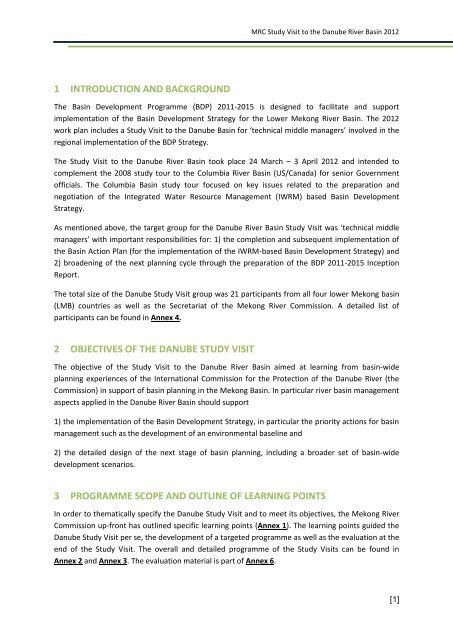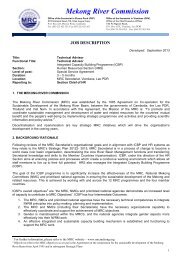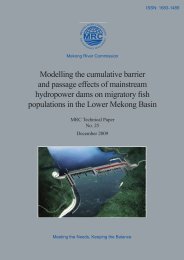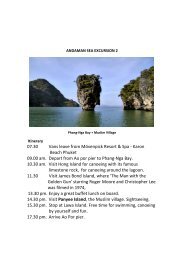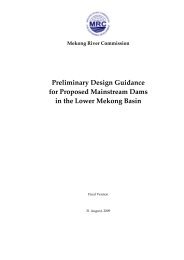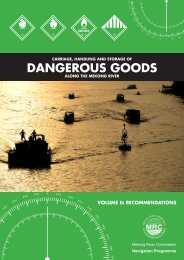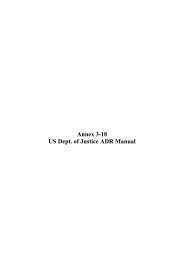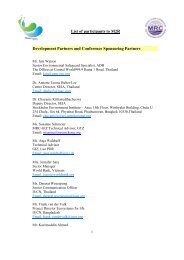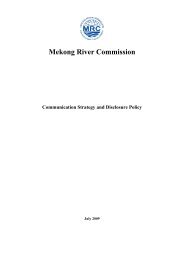evaluation of the study visit - Mekong River Commission
evaluation of the study visit - Mekong River Commission
evaluation of the study visit - Mekong River Commission
You also want an ePaper? Increase the reach of your titles
YUMPU automatically turns print PDFs into web optimized ePapers that Google loves.
1 INTRODUCTION AND BACKGROUND<br />
MRC Study Visit to <strong>the</strong> Danube <strong>River</strong> Basin 2012<br />
The Basin Development Programme (BDP) 2011-2015 is designed to facilitate and support<br />
implementation <strong>of</strong> <strong>the</strong> Basin Development Strategy for <strong>the</strong> Lower <strong>Mekong</strong> <strong>River</strong> Basin. The 2012<br />
work plan includes a Study Visit to <strong>the</strong> Danube Basin for ‘technical middle managers’ involved in <strong>the</strong><br />
regional implementation <strong>of</strong> <strong>the</strong> BDP Strategy.<br />
The Study Visit to <strong>the</strong> Danube <strong>River</strong> Basin took place 24 March – 3 April 2012 and intended to<br />
complement <strong>the</strong> 2008 <strong>study</strong> tour to <strong>the</strong> Columbia <strong>River</strong> Basin (US/Canada) for senior Government<br />
<strong>of</strong>ficials. The Columbia Basin <strong>study</strong> tour focused on key issues related to <strong>the</strong> preparation and<br />
negotiation <strong>of</strong> <strong>the</strong> Integrated Water Resource Management (IWRM) based Basin Development<br />
Strategy.<br />
As mentioned above, <strong>the</strong> target group for <strong>the</strong> Danube <strong>River</strong> Basin Study Visit was ‘technical middle<br />
managers’ with important responsibilities for: 1) <strong>the</strong> completion and subsequent implementation <strong>of</strong><br />
<strong>the</strong> Basin Action Plan (for <strong>the</strong> implementation <strong>of</strong> <strong>the</strong> IWRM-based Basin Development Strategy) and<br />
2) broadening <strong>of</strong> <strong>the</strong> next planning cycle through <strong>the</strong> preparation <strong>of</strong> <strong>the</strong> BDP 2011-2015 Inception<br />
Report.<br />
The total size <strong>of</strong> <strong>the</strong> Danube Study Visit group was 21 participants from all four lower <strong>Mekong</strong> basin<br />
(LMB) countries as well as <strong>the</strong> Secretariat <strong>of</strong> <strong>the</strong> <strong>Mekong</strong> <strong>River</strong> <strong>Commission</strong>. A detailed list <strong>of</strong><br />
participants can be found in Annex 4.<br />
2 OBJECTIVES OF THE DANUBE STUDY VISIT<br />
The objective <strong>of</strong> <strong>the</strong> Study Visit to <strong>the</strong> Danube <strong>River</strong> Basin aimed at learning from basin-wide<br />
planning experiences <strong>of</strong> <strong>the</strong> International <strong>Commission</strong> for <strong>the</strong> Protection <strong>of</strong> <strong>the</strong> Danube <strong>River</strong> (<strong>the</strong><br />
<strong>Commission</strong>) in support <strong>of</strong> basin planning in <strong>the</strong> <strong>Mekong</strong> Basin. In particular river basin management<br />
aspects applied in <strong>the</strong> Danube <strong>River</strong> Basin should support<br />
1) <strong>the</strong> implementation <strong>of</strong> <strong>the</strong> Basin Development Strategy, in particular <strong>the</strong> priority actions for basin<br />
management such as <strong>the</strong> development <strong>of</strong> an environmental baseline and<br />
2) <strong>the</strong> detailed design <strong>of</strong> <strong>the</strong> next stage <strong>of</strong> basin planning, including a broader set <strong>of</strong> basin-wide<br />
development scenarios.<br />
3 PROGRAMME SCOPE AND OUTLINE OF LEARNING POINTS<br />
In order to <strong>the</strong>matically specify <strong>the</strong> Danube Study Visit and to meet its objectives, <strong>the</strong> <strong>Mekong</strong> <strong>River</strong><br />
<strong>Commission</strong> up-front has outlined specific learning points (Annex 1). The learning points guided <strong>the</strong><br />
Danube Study Visit per se, <strong>the</strong> development <strong>of</strong> a targeted programme as well as <strong>the</strong> <strong>evaluation</strong> at <strong>the</strong><br />
end <strong>of</strong> <strong>the</strong> Study Visit. The overall and detailed programme <strong>of</strong> <strong>the</strong> Study Visits can be found in<br />
Annex 2 and Annex 3. The <strong>evaluation</strong> material is part <strong>of</strong> Annex 6.<br />
[1]


